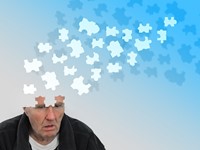RMTAO Blog
Massage Therapy for People with Alzheimer’s Disease
BlogImage
January is Alzheimer’s Awareness Month, which was created as an opportunity to help Canadians learn more about the effects dementia has on someone’s life as well as the lives of their families. As the population of seniors in Canada continues to increase, so does the numbers of people living with Alzheimer’s disease and other forms of dementia. There are a variety of symptoms of Alzheimer’s Disease that can disrupt someone’s life. Massage therapy can help people with Alzheimer’s disease and other forms of dementia relieve symptoms of anxiety, depression and agitation and bring some improvement to their quality of life.
Regularly applied hand massage can help decrease agitation in people with dementia, which includes decreasing the frequency and intensity of agitated behaviors such as wandering. Massage therapy can also offset the social isolation that can lead to this agitation and related behaviour. It can also help people with dementia feel comforted, especially in a residential care environment, as it is often the only positive physical touch they regularly receive.
About a third of people with dementia experience symptoms of depression, and massage therapy is one of the non-drug interventions that can help people with dementia relieve their symptoms of depression. Massage therapy, and physical touch in general can also help people with dementia relieve symptoms of anxiety. Chronic pain is likely common among people with dementia, but it can be more difficult to identify as they are less able to report it. Chronic pain can make agitated behaviours in people with dementia more severe. Treatments like massage therapy and positive touch in general that can help reduce stress and agitation can likely also help reduce pain, and vice-versa.
If the patient with dementia is not comfortable with the massage then their anxiety and agitated behaviours can increase likely due to the violation in their personal space. This is why it’s important for the RMT to understand their patient’s nonverbal cues and work closely with the patient’s substitute decision maker if applicable, to ensure that the patient is comfortable and they are obtaining informed consent. Massage can help reduce a variety of symptoms in people with dementia, at least in part due to the positive human contact, which can ultimately help restore a level of humanity to people with dementia and help improve their quality of life.
Although more research should be done on the benefits of massage therapy for people with Alzheimer’s disease and other forms of dementia, massage therapy can still be a low-risk potentially beneficial way to help that population. People with dementia don’t have as many opportunities for positive touch in their lives, and massage therapy provides that opportunity. Massage therapy also helps people with dementia manage anxiety and depression, which can in turn lead to less agitated bevariours. Find an RMT at RMTFind.com and ask them how they might be able to help your friend or family member with dementia.
References
Abraha, I., Rimland, J. M., Trotta, F. M., Dell'Aquila, G., Cruz-Jentoft, A., Petrovic, M., Gudmundsson, A., Soiza, R., O'Mahony, D., Guaita, A., & Cherubini, A. (2017). Systematic review of systematic reviews of non-pharmacological interventions to treat behavioural disturbances in older patients with dementia. The SENATOR-OnTop series. BMJ open, 7(3), e012759.
Anderson, A. R., Deng, J., Anthony, R. S., Atalla, S. A., & Monroe, T. B. (2017). Using Complementary and Alternative Medicine to Treat Pain and Agitation in Dementia: A Review of Randomized Controlled Trials from Long-Term Care with Potential Use in Critical Care. Critical care nursing clinics of North America, 29(4), 519–537.
Scales, K., Zimmerman, S., & Miller, S. J. (2018). Evidence-Based Nonpharmacological Practices to Address Behavioral and Psychological Symptoms of Dementia. The Gerontologist, 58(suppl_1), S88–S102.
Schaub, C., Von Gunten, A., Morin, D., Wild, P., Gomez, P., & Popp, J. (2018). The Effects of Hand Massage on Stress and Agitation Among People with Dementia in a Hospital Setting: A Pilot Study. Applied psychophysiology and biofeedback, 43(4), 319–332.
Suzuki M, Tatsumi A, Otsuka T, Kikuchi K, Mizuta A, Makino K, Kimoto A, Fujiwara K, Abe T, Nakagomi T, Hayashi T, Saruhara T. Physical and psychological effects of 6-week tactile massage on elderly patients with severe dementia. Am J Alzheimers Dis Other Demen. 2010 Dec;25(8):680-6.
Watt, J. A., Goodarzi, Z., Veroniki, A. A., Nincic, V., Khan, P. A., Ghassemi, M., Lai, Y., Treister, V., Thompson, Y., Schneider, R., Tricco, A. C., & Straus, S. E. (2021). Comparative efficacy of interventions for reducing symptoms of depression in people with dementia: systematic review and network meta-analysis. BMJ (Clinical research ed.), 372, n532.


